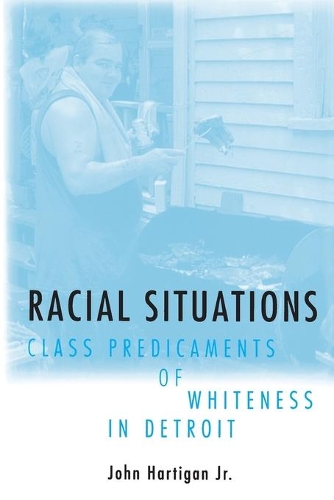
Racial Situations: Class Predicaments of Whiteness in Detroit
(Paperback)
Publishing Details
Racial Situations: Class Predicaments of Whiteness in Detroit
By (Author) John Hartigan
Princeton University Press
Princeton University Press
3rd January 2000
United States
Classifications
Professional and Scholarly
Non Fiction
Anthropology
Ethnic studies / Ethnicity
305.8034077434
Physical Properties
Paperback
360
Width 197mm, Height 254mm
567g
Description
Racial Situations challenges perspectives on race that rely upon oft-repeated claims that race is culturally constructed and, hence, simply false and distorting. John Hartigan asserts, instead, that we need to explain how race is experienced by people as a daily reality. His starting point is the lives of white people in Detroit. As a distinct minority, whites in this city can rarely assume they are racially unmarked and normative--privileges generally associated with whiteness. Hartigan conveys their attempts to make sense of how race matters in their lives and in Detroit generally. Rather than compiling a generic sampling of white views, Hartigan develops an ethnographic account of whites in three distinct neighborhoods--an inner city, underclass area; an adjacent, debatably gentrifying community; and a working-class neighborhood bordering one of the city's wealthy suburbs. In tracking how racial tensions develop or become defused in each of these sites, Hartigan argues that whites do not articulate their racial identity strictly in relation to a symbolic figure of black Otherness.He demonstrates, instead, that intraracial class distinctions are critical in whites' determinations of when and how race matters. In each community, the author charts a series of names--"hillbilly," "gentrifier," and "racist"--which whites use to make distinctions among themselves. He shows how these terms function in everyday discourses that reflect the racial consciousness of the communities and establish boundaries of status and privilege among whites in these areas.
Reviews
"Hartigan is a good storyteller ... and a clear analyst of how local residents, black and white, make sense of race as it affects their lives and their sometimes desperate attempts to make do in this impoverished bit of the city... By asking us to see race and class in different ways, this book helps us to imagine a world where such categories might be meaningless or superseded, even as it immerses us in the intractable, dangerous and hurtful relationships these fields of inequality perpetuate around us."--Marc Christensen, Metro Times Detroit "A sobering examination of the tangled web of race, class, and struggles over space."--Choice "This inventive, impressive [book] ... contributes to the reorientation of studies of white identity ... [It will] reward historians who venture into this ambitious anthropological account."--David Roediger, Journal of American Ethnic History "This is an excellent book that ought to be widely read ... Substantively important, theoretically sophisticated, and full of unforgettable characters."--Eduardo Bonilla-Silva, Contemporary Sociology
Author Bio
John Hartigan Jr. is Assistant Professor in the Institute of Anthropology at the University of North Texas. His work on "white trash" and the "white underclass" has been published in a range of journals and edited volumes.
